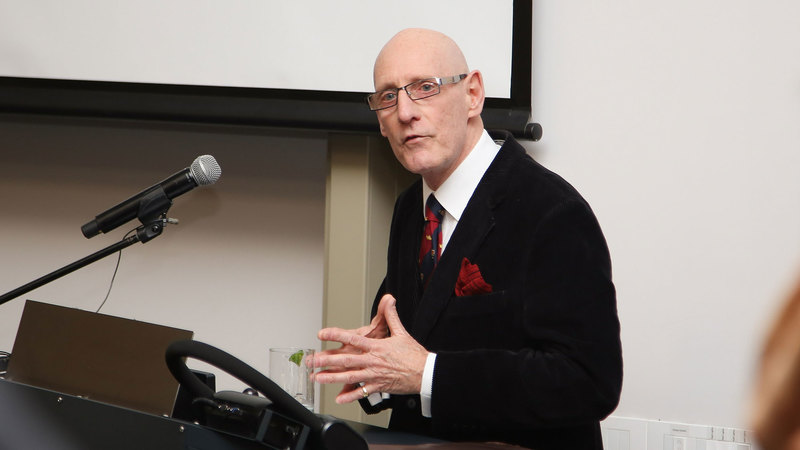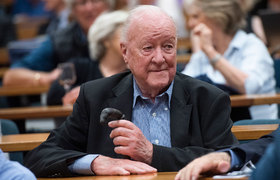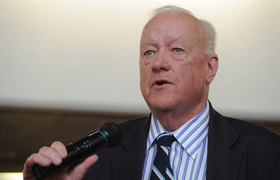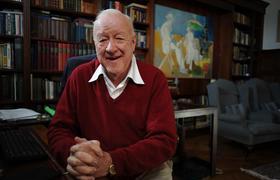Dr Stuart Saunders Lecture: The Nine Circles of Scholarship
29 May 2023 | Story Nicole Forrest. Photo Je’nine May. Read time 9 min.
After a three-year hiatus, the University of Cape Town (UCT) once again presented the Dr Stuart John Saunders Lecture on 22 May. Delivered by Distinguished Professor Philippe-Joseph Salazar, the third edition of the lecture, titled “The Nine Circles of Scholarship”, took place on UCT’s health sciences campus at Groote Schuur Hospital.
Held in honour of the former vice-chancellor and professor of medicine at UCT, the lecture was established to pay tribute to Dr Saunders’ impactful medical research as well as the values he demonstrated during his 15-year tenure as vice-chancellor.
According to Vice-Chancellor (Interim) Emeritus Professor Daya Reddy, the university has Saunders to thank for its standing as a world-class institution today.
“Professor Stuart Saunders served as vice-chancellor from 1981 to 1997. As vice-chancellor, he demonstrated an unswerving commitment to academic freedom, clarity about the values that we espouse and need to live up to, the centrality of scholarship of a high standard and a clear-eyed view of the path ahead, both as a university and country,” said Professor Reddy.
“Stuart John Saunders was the epitome of a university leader.”
“Stuart Saunders led UCT through a turbulent period during which, with great courage, he challenged the level of impact, on universities, of apartheid in its various forms. His impact on medicine, whether the profession or scholarship, was immense. Stuart John Saunders was the epitome of a university leader.”
Professor Ntobeko Ntusi, the head of medicine and the clinical lead for cardiovascular magnetic resonance and cardiovascular computed tomography at Groote Schuur Hospital, echoed these sentiments, noting that the mission of future-proofing UCT began under Saunders’ watch.
“Professor Saunders is remembered for his role in ending racially segregated training of medical specialists at UCT. His courageous leadership also saw him overseeing the fast admissions of students of all races into UCT residences,” explained Professor Ntusi.
“He was forward looking and invested heavily in future-proofing our university. Specifically, he established the UCT Legacy Society and initiated fundraising for the protection of academic freedom at UCT.”
The scholar’s scholar
A close friend of both Saunders and his wife, Anita, Professor Salazar was a fitting choice for the reopening of this esteemed lecture series. As Saunders was, Salazar is deeply passionate about education and nurturing young scholars.
A distinguished professor in rhetoric and humane letters in the Faculty of Law at UCT, Salazar also established the Centre for Rhetoric Studies, which focuses on research in public rhetoric, deliberative democracy and argumentative culture, at the university.
For Salazar, rhetoric is a means to bridge the many divides that we experience with and among other human beings. In his view, academic freedom rests on a scholar’s freedom. "A scholar's freedom, that is to excercise one own's freedom, as a scholar, and to decide who is worthy of being given the fruits of scholarship."
“It is about the ghosts that inhabit the morality of scholarship.”
Further to this, Salazar believes that rhetoric is not about platitudes such as robust debate, but about a search for veracity devoid of ideology. Scholars must engage in debate and discourse to build and improve understanding, as well as to influence and persuade.
With this in mind, the distinguished professor centred his address around the nine circles of hell, as described in Dante’s Inferno, undertaking a tropological reading of the well-known allegory to highlight the pitfalls that academics need to be cognisant of in their scholarly endeavours.
“Travelling down the nine circles of hell will provide an understanding of what scholars should not be. It’s not about the virtues of scholarship or all that is good and glorious and praiseworthy, and rated C to A. But it is about the ghosts that inhabit the morality of scholarship,” he said.
Looking deeper for scholarly value
Standing in the first circle of hell, known as limbo, Dante and Virgil are surrounded by philosophers and the great thinkers of the ancient world. They did not have the benefit of the Revelation.
In his tropological reading, Salazar noted that this circle serves as a warning to scholars to discourage them from remaining at the level of perception. Rather than behaving like the public and accepting ideas at face value, scholars must interrogate their intellectual standpoints.
“Opinion presented by scholars as veracity and established fact is logically invalid. When scholars behave like the public, they fail at being scholars,” he explained.
In the second and third circles, Dante is confronted with those whose lives have been led by lust and gluttony. According to Salazar, these two vices can often be observed in scholarship.
“Gluttony in scholarship happens when one feeds on anything that comes close and within grasp.”
“Scholars are not supposed to fall in love with ideas; they are not supposed to be in love with what they think. They must maintain a distance. Getting infatuated with a topic, a research theme, and an idea is dangerous.
“Gluttony in scholarship happens when one feeds on anything that comes close and within grasp. It can be seen in the bloated footnotes of research papers, the swelling of the body of an article with other scholars’ scholarship without, usually, any sort of pointed, coherent explanation.
“To avoid hell four, where the greedy are housed, scholars must be careful not to hoard or be miserly with their scholarship. A hoarder scholar is never deviating from his or her primary idea – be it a dissertation or a first book – everything always comes back to it,” Salazar said.
“In scholarship, there is worth and there is value. Worth is intrinsic; it resides within the field and discipline in which the scholar creates ideas. Value is extrinsic; it is assigned from outside through protocols.
“The industrialisation of academia discourages the type of scholarship that is purely focused on the value it brings to the scholar and therefore the university,” he added.
The challenges of academic life
Journeying further, into the fifth circle of hell and beyond, Dante and Virgil are met with a river of sludge before encountering the Dissatisfied, whose existence was dominated by anger; the heretics, who rejected prevailing political and religious norms; and those who were violent towards others, themselves, and God or nature.
“The river of slime is a powerful allegory for those who see time and life pass by, flow by, irretrievably and then fall into a deep dissatisfaction as they would fall into a sludge.
“Being dissatisfied – especially when you are employed by a university – is quite common. Often, the dissatisfied scholar will turn a personal grievance into an intellectual battle and will rally forces because it must be shown that necessarily it’s not a personal grievance,” he said.
“However, the scholar is supposed to brood over matters of the mind. Hence, he needs to retreat from too much intercourse, too much engagement, too much company, too many distractions.”
Speaking about the seventh circle of hell, Salazar noted that heresy is a vice that is particularly worrisome in relation to young scholars. “Often, intellectual heresy and partisanship are presented as more dignified, more important, more ethical, more moral, more valuable, more useful, than everything else.
“Those who really are in danger here are the young scholars. For young scholars to declare upfront, ‘I believe that; I am passionate about,’ can keep them from letting the evidence lead them to what is right and what is truthful,” he said.
Violence in the tropological reading, according to Salazar, can be linked to the hoarding touched on in hell four. To place scholars under duress and force them to share their research with “all and sundry”, is a violence against those scholars, he noted.
Advocating engagement
Approaching the eighth and ninth circles of hell, Salazar left it to the audience to ponder the pitfalls of fraud and treachery, considering them within the framework of scholarship; a “home exercise” for the audience to engage with to strengthen their scholarly reasoning.
“I have tried tonight, I hope, to raise questions, to raise doubts, to utter blasphemy. Also, in any event, I’ve tried to give you my very small gift of scholarship. I expect no return.
“I am sure of this: I have not betrayed Stuart and Anita Saunders, whose memory we honour today. As they look down on us today, I am quite sure that they think this university is a place of scholars,” he concluded.
 This work is licensed under a Creative Commons Attribution-NoDerivatives 4.0 International License.
This work is licensed under a Creative Commons Attribution-NoDerivatives 4.0 International License.
Please view the republishing articles page for more information.










